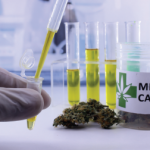Barbara Goldstein, MD, MMSc, hears this question from patients throughout the day, every day. And she has noticed an increase in the number of patients asking it since 2014, when marijuana was legalized for anyone over the age of 21 to purchase in Colorado.1 Her answer is the same for each patient: “We just don’t have enough reliable data to suggest cannabinoid use for patients.”
Dr. Goldstein worries that inhaled cannabis poses an antigen risk to the lungs and that cannabis edibles vary dramatically in dosing and the tetrahydrocannabinol (THC) content responsible for its mind-altering effects. “Topicals may be safe and effective, but we just don’t have clinical trials and reliable preparations. I tell my patients all of this and that they have to use it at their own risk.
“What we need are trials that are conducted using scientific methods, are hypothesis driven and [use a] placebo or comparator product,” she suggests. “Then we can review the information and decide how clinically relevant and generalizable [medicinal cannabis] really is.”
Some rheumatologists are taking a different approach. Jeff Peterson, MD, also shares his hope for clinical data on cannabis applications for patients with rheumatic diseases.
With this lack of data and faced with daily requests from patients about incorporating cannabis into their treatment, Dr. Peterson took a trip to a local, high-end pot shop in Washington, where marijuana become legal to sell in 2014.2 His goal was to understand what his patients were hearing from marijuana retailers. He learned how this retailer talks to customers about some of the common chemical compounds in recreational marijuana, including THC vs. cannabidiol (CBD), and received an education on different forms of marijuana, including edibles, tinctures and topical creams and ointments.
Dr. Peterson has also learned anecdotally about the perceived efficacy of marijuana from patients choosing to try it in different forms. The majority of his patients who use cannabis choose the topical cream or ointment to manage pain and find it helpful. But they note that the preparation—the dose and combination of THC/CBD—does make a difference. His patients who use a tincture form that is placed on the tongue report that it is effective for moderate relief of insomnia and anxiety, particularly among his patients with fibromyalgia. But these patients also note a difference with the dose and combination of THC/CBD.
Although Dr. Peterson puts himself on the more holistic side of the rheumatology spectrum, he feels his patients deserve to be empowered with whatever knowledge is available and would prefer his patients feel comfortable talking to him about what they are using to complement their traditional treatment.




